Thoughts on Mass Effect 2
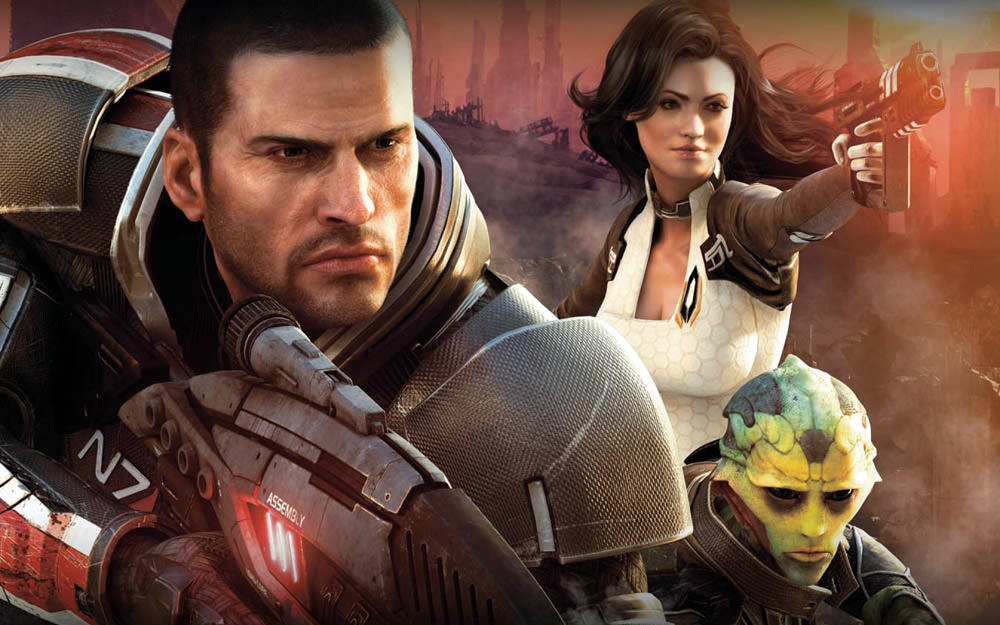
Note: This article contains spoilers. Proceed at your own risk.
I don’t get to play too many video games these days, for a couple of obvious reasons. So when I do get some time for gaming, I want to make sure it’s worth it. Which, for me, means skipping all of the countless first person shooters and going right for games that are a bit more substantial. Which basically means that I end up playing anything and everything released by BioWare.
Since its inception in 1995, the Canadian company has made a name for themselves via incredibly detailed and complex role-playing games such as Neverwinter Nights (2002), Star Wars: Knights of the Old Republic (2003), and Dragon Age: Origins (2009). And with Mass Effect 2, the second game in a planned trilogy, they’ve continued that trend and then some.
The game, like many of BioWare’s titles, has garnered massive amounts of both critical and popular acclaim: the game currently has a score of 96 at Metacritic and sold 1.1 million copies for the Xbox 360 in the month of January alone (which is all the more impressive considering the game was released within the last six days of the month).
And it’s not at all difficult to see why: the game is epic in a way that all great galaxy-spanning sci-fi is, packed with adventure, cool gadgets, exotic alien babes, and fearsome alien baddies. Basically, it lets you fulfill all of those hero fantasies that involved cruising around the interstellar spaceways in a big, bad-ass spaceship — and who can resist that? And given BioWare’s name on the packaging, it’s incredibly well-made, good-looking graphics and a slew of great voice acting that includes such luminaries as Martin Sheen, Carrie-Anne Moss, Seth Green, Tricia Helfer, and Adam Baldwin. BioWare has truly created a rich, involved game world for players to explore.
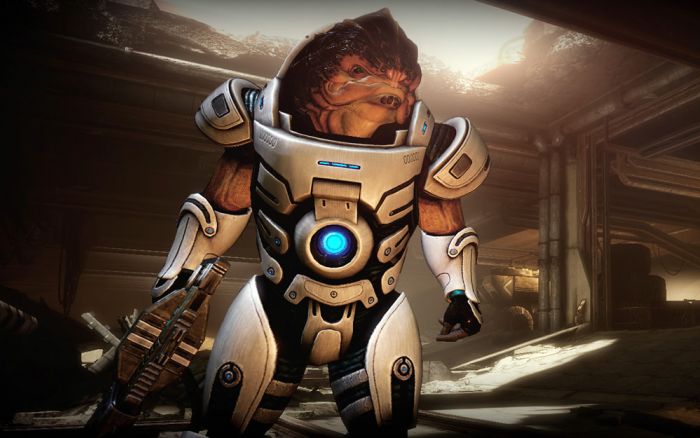
But that’s not what really makes Mass Effect 2 — and by extension, all of BioWare’s games — special. Good-looking graphics, voice acting, sci-fi trappings: those things are a dime a dozen in today’s current game market. Rather, what makes the Mass Effect series so involving is BioWare’s emphasis on morality. That is to say, on continually forcing the player to explore and make moral choices — choices that can sometimes be quite serious and provocative, and that can have significant ramifications, not just for the player’s character (Commander Shepard), but for the entire galaxy.
This becomes quite apparent from the very beginning of Mass Effect 2. In the opening minutes of the game, you (as Commander Shepard) lose your ship, many of your friends and comrades, and your life. Jump forward a couple of years, and Shepard has been rebuilt and re-animated by Cerberus, a shadowy pro-human organization, to help combat the growing disappearance of human colonists.
In the first game, Cerberus was one of the antagonists, albeit a minor one. Now, you find yourself allied with them and their mysterious leader, the so-called Illusive Man — even if you don’t agree with their oftentimes extreme methods. But you know how the saying goes: the enemy of my enemy is my friend.
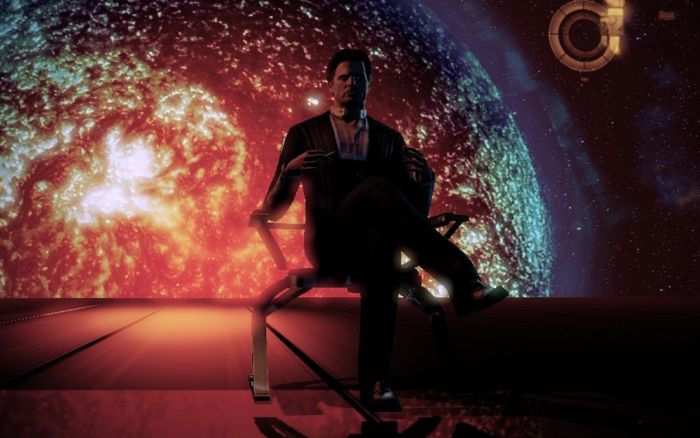
Underlying the entire game is this ideological battle between your character, who was once considered humanity’s best example to the rest of the galaxy, and the Illusive Man, who is a very powerful ally but who clearly has his own agenda and is not above using illegal experiments, terrorism, and assassination to achieve it. Time and again, you’ll find yourself butting heads with the guy that literally raised you from the dead.
And of course, being raised from the dead brings with it its own set of ethical and moral quandaries. If you owe your very existence to technologies and methods that are questionable at best, how can you object to others using similar methods to achieve their goals?
This all really comes to a head during the game’s “loyalty missions.” As you progress through the game, you acquire allies — soldiers, scientists, etc. — with the hopes of creating a team capable of successfully defeating those responsible for decimating humanity’s colonies. But these allies have their own goals, desires, and objectives, and in order to gain their loyalty, it’s necessary to help them with personal missions. It could be tracking down a long lost family member or avenging some fallen comrades. Some missions are more elaborate and involved than others, but they all have effects when it comes to saving the galaxy, acquiring some new abilities or gear, and even romance (another one of BioWare’s hallmarks). Here are two examples.
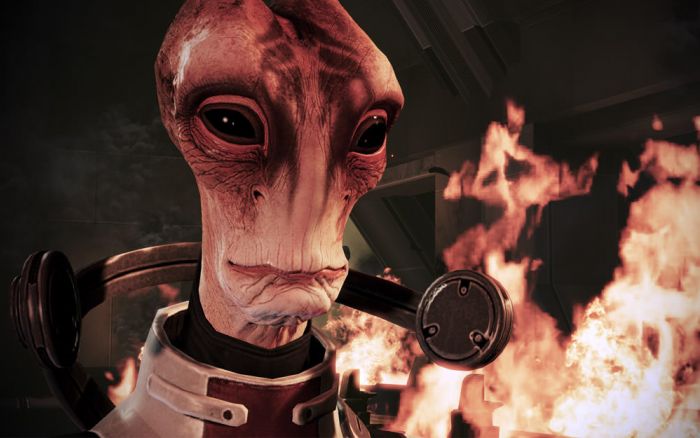
Early in the game, you’re asked by Mordin Solus, your team’s brilliant Salarian scientist track down a former protege. As you engage Solus in conversation, you discover that he was responsible for a genophage used to control another race’s population. It’s possible to get involved in some surprisingly involved ethical discussions concerning the genophage, with Solus defending his decision time again as one that was in the galaxy’s best interests. You also learn that, despite that conclusion, he’s had doubts over the years, even turning to religion to find some solace.
When you finally track down Solus’ protege, you learn that he has been attempting to cure the genophage, but has been conducting grotesque experiments in the process. Which again, raises the question of how the ends can justify the means. And when you complete the mission, and are given the opportunity to either destroy the protege’s ill-obtained research or keep it for future use, one can’t help but think of the modern dilemma surrounding the use of data from Nazi medical experiments. Indeed, I wouldn’t be surprised to learn that BioWare had this exact quandary in mind when developing this particular storyline. (And just for the record, I trust you won’t infer that I am, in any way, downplaying or belittling one of the most significant ethical dilemmas of our time simply because I said that a video game caused me to recall it.)
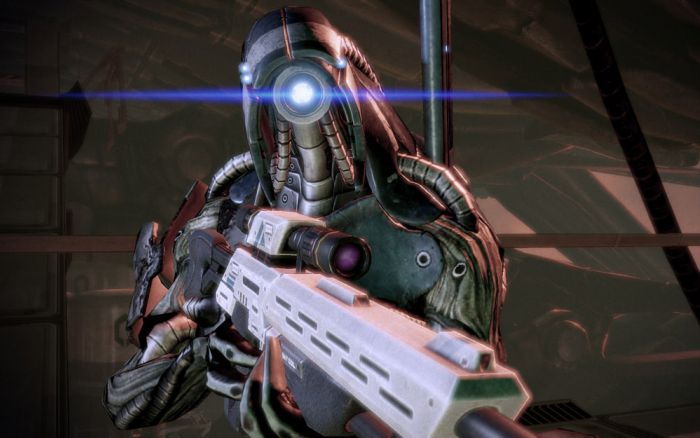
Later in the game, you can choose to team up with Legion, a member of the geth race that seems to have a particular interest in Commander Shepard. The geth, a race of artificial intelligence, were the first game’s primary antagonists, but as you learn from Legion, those were in fact “heretics” that had violently broken away from the main geth body. Legion asks for your help to track down the remaining heretics and disable a virus that they plan to use on all of the other geth, but also reveals that the virus can be turned against the heretics to either destroy them or “rewrite” them (i.e., convert them back to the geth “orthodoxy”). In other words, you can commit mass murder or you can engage in what amounts to religious brainwashing.
And these are just two examples. The game is full of many others. It’s worth noting that the game doesn’t judge your choices as “good” or “evil”; it’s much more ambiguous than that. Rather, the terms “paragon” and “renegade” are used, with the former being the nobler option and the latter being the more ruthless one. But that’s no clear indicator as to which path to take, or which path is “right” and which one is “wrong”.
A “paragon” choice might be noble at the time, but it could have disastrous consequences down the road. You may choose to spare the heretic geth, but not only do you become complicit in their brainwashing, you’ve also increased the overall geth force — and there’s still a real concern over whether or not they’ll be a threat to the galaxy. What’s more, such a choice might affect relationships with other members of your team, which could impact the success of your primary mission.
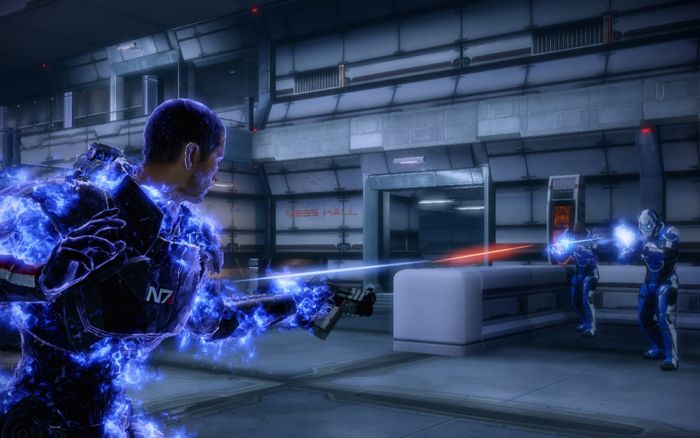
In the Mass Effect games, every choice has potentially galactic ramifications, and you may not even know what all of those ramifications are until Mass Effect 3‘s credits have finished rolling. Don’t be surprised if, during the game, you find yourself putting down the controller and walking away for a bit as you try to figure out the potential effects of your options, and hoping that you — or at least, your character — can live with the decision you’re about to make.
Some other random thoughts/observations:
- One thing that did bother me about the game’s plot is that it’s never quite clear how covert your mission is supposed to be. You’re working with a shadowy organization that some accuse of being terrorists, and yet you’re gallivanting around the galaxy in a spaceship that has their logo plastered all over its hull. At times, it seems like it would be wiser to stick to the shadows, given the reputation of your allies. But when you arrive at the seat of galactic power, nobody seems to bat an eye.
- The original Mass Effect stirred up some controversy with its sexual content. As such, I find it funny that Mass Effect 2 contains quite a bit more opportunity for sexual escapades. There are more romantic options, you can juggle several relationships at once, and you can even get one of your crew to be your, um, private dancer. You can, of course, skip any amorous activity altogether, and just focus on saving the galaxy.
- The longer-than-long elevator rides are gone. Thank goodness.
- Another complaint about the first game was using the Mako to explore planets. Let’s face it: any ground vehicle in a sci-fi video game is going to be compared to the Halo series’ Warthog, and the Mako didn’t come close. In Mass Effect 2, you explore planets via a ship scanner, which lets you find minerals (necessary for upgrades) and anomalies (which lead to small side missions). I found planet scanning to actually be quite relaxing and, when I hit a large deposit of, say, platinum or element zero, quite rewarding. The use of the controller’s vibration to alert you to the location and size of a mineral deposit was not only in-line with the haptic interfaces used by the game’s characters, but it also made it possible to scan planets in your sleep, which came in quite handy during late night/early morning gaming sessions.
- I’m all for streamlining games and getting players to the action more quickly. But part of me misses the previous game’s more involved inventory system. Then again, I’m the kind of obsessive compulsive nerd who will spend 30 minutes making sure that my character’s eye color is just right.
- I played through Mass Effect 2 as a Vanguard, and while the new Charge ability is nice, there’s something particularly satisfying about using Shockwave to send a group of baddies flying.
All of this is to say that I’m really looking forward to Mass Effect 3. Not only do I want to spend more time flying around the galaxy in a shiny spaceship, I want to see which of my decisions impacted the galaxy, and how.
It looks like I’ll have to wait until late 2011/early 2012 before that happens, but that’s fine. I don’t think I’ll be disappointed.